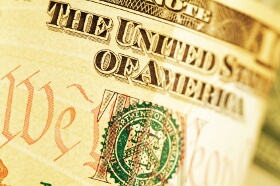The US dollar surged against the euro and other major counterparts on Friday, as the economy in the United States created more jobs than expected in July. The gap between US imports and exports narrowed in June, which pushed an index that tracks the greenbackâs strength toward its best level in 7 trading sessions.
The Bureau of Labor Statistics said in an employment report that was released earlier today that nonfarm labor payroll gained 209,000 jobs in July. The increase followed a bigger gain of 231,000 jobs in June and far exceeded expectations of 183,000 more jobs last month.
The biggest part of the employment gain was in restaurants and food services, which hired 53,000 more workers in July to reach a total of 313,000 more jobs over the last 12 months. Professional and business services came in a close second after adding 49,000 employees last month. The health care sector created 39,000 new jobs in June to reach 327,000 jobs in the past year.
The report also added that average hourly earnings for employees in the private sector increased $0.09 to $26.36. Meanwhile, the unemployment rate decreased from 4.4% in June to 4.3% in July with about 7.0 million unemployed persons.
The shrinking unemployment rate and the strong job gains support the Federal Reserveâs case for tightening monetary policy soon. However, a third interest rate hike in 2017 is still far from being a certainty despite todayâs data. The CME Group FedWatch tool, which tracks prices of federal funds futures to measure investorsâ anticipation for rate changes, showed a 42.5% probability of an increase in December.
Federal Reserve officials signaled that the central bank may begin reducing its massive balance sheet later this year, which may delay increasing interest rates. However, policymakers in the Federal Open Market Committee will have more reports on economic growth, job gains, and inflation to study before their last policy meeting this year.
A separate report from the US Bureau of Economic Analysis stated that the trade gap between imports and exports narrowed from $46.40 billion in May to $43.60 billion in June. Exports increased $2.4 billion to $194.4 billion amid higher capital goods and foods exports, while imports decreased $0.4 billion to $238.0 billion as less industrial supplies were brought into the United States.
The data further supported the US dollar, which has been on a downtrend for more than a week.
EUR/USD traded at 1.1750 as of 16:25 GMT on Friday from 1.1738 at 14:20 GMT, the pairâs lowest level since July 31. EUR/USD began trading today at 1.1883.
The Dollar Index, which measures the strength of the US currency against its major counterparts, rose to 93.67 today, the highest level since July 27, from 92.83 yesterday.
If you have any questions, comments or opinions regarding the US Dollar,
feel free to post them using the commentary form below.
